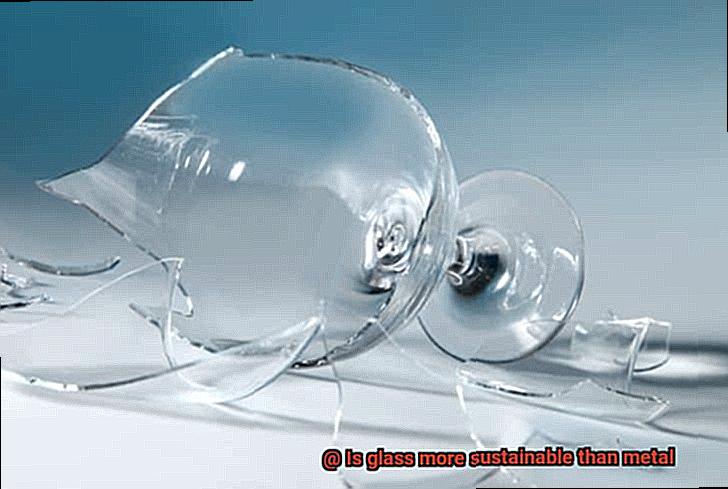Have you ever stopped to think about the impact of the products you use every day on the environment? With so many materials available, it can be tough to determine which ones are truly sustainable. That’s why we’re going to explore the age-old question: Is glass more sustainable than metal?
Glass and metal are ubiquitous in consumer goods, from food packaging to home decor. But when it comes to sustainability, which one is better? It’s a hotly debated topic with no clear-cut answer.
On one hand, glass is made from natural materials and can be recycled indefinitely without losing quality. Plus, it’s non-toxic and doesn’t pose any health risks associated with certain metals. On the other hand, metal is known for its strength, durability, and versatility. It can be recycled multiple times, and some metals like aluminum have a high recycle value.
So, what’s the verdict? Well, that depends on several factors. Join me as we take a closer look at both materials’ environmental impact to make an informed decision about which option is more sustainable.
Let’s dive into the world of glass and metal together.
Overview of Glass and Metal
Contents
- 1 Overview of Glass and Metal
- 2 Recyclability of Glass and Metal
- 3 Energy Requirements for Glass and Metal Production
- 4 Environmental Impact of Mining Metals
- 5 Durability of Metal Products
- 6 Biodegradability of Glass and Metal
- 7 Overall Comparison of Sustainability Between Glass and Metal
- 8 Conclusion
Glass and metal are two versatile materials that have found their way into various industries, including construction, packaging, automotive, and electronics. While both materials have unique properties that make them ideal for specific applications, understanding their sustainability is crucial for making informed decisions about their usage.
Glass is a natural material made from sand, soda ash, and limestone, which are abundant and easily accessible. This 100% recyclable material can be continuously recycled without losing its quality or purity. Glass is a closed-loop system that can be reused indefinitely without adding to the waste stream. Additionally, glass is inert and does not leach harmful chemicals into the environment, making it a safer option for packaging and storage.
In contrast, metals such as aluminum and steel require a significant amount of energy to extract and process from their ores. The mining and refining processes of metals also contribute to environmental degradation and pollution. While metals are also recyclable, the recycling process requires a lot of energy, and the resulting recycled material may not be of the same quality as the original material. Furthermore, metals do not biodegrade and may leach toxic substances into the soil and water if not disposed of properly.
Although glass appears to be more sustainable than metal due to its abundance, recyclability, and lack of harmful environmental impact, both materials have unique properties that make them ideal for specific applications. For example, metal’s superior durability can reduce waste generation and the need for frequent replacement in certain products like construction materials.
Recyclability of Glass and Metal
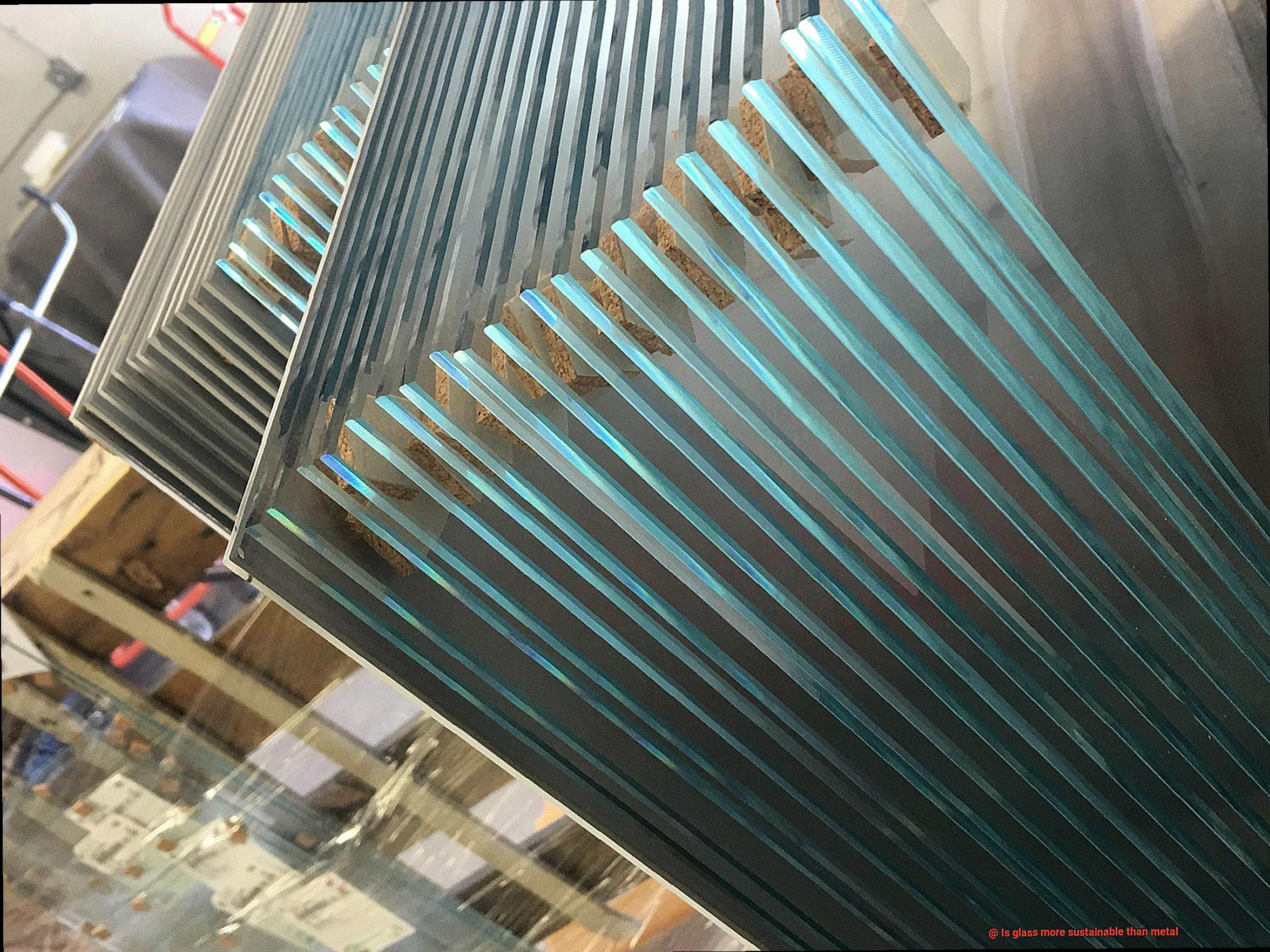
While both can be recycled, their recyclability rates differ significantly.
Let’s start with glass – did you know that it’s 100% recyclable? That means it can be recycled endlessly without losing its quality or purity. The process involves crushing and melting the glass, which can then be used to create new glass products. Recycling just one ton of glass saves 1.2 tons of raw materials, and reduces carbon emissions by nearly a ton. Plus, using recycled glass requires less energy than using raw materials, making it a more eco-friendly option.

Now, let’s turn to metal recycling. Some metals like aluminum and steel have fantastic recycling rates, but others like copper and brass struggle due to the high cost and difficulty of separating them from other materials during recycling. For example, recycled aluminum can save up to 95% of the energy needed to produce new aluminum, while steel has an impressive recycling rate of around 88%.
It’s important to consider the efficiency of the recycling process, which depends on factors like collection methods, sorting processes, and market demand for recycled materials. However, overall, glass has a higher recyclability rate compared to some metals like copper and brass.
Energy Requirements for Glass and Metal Production
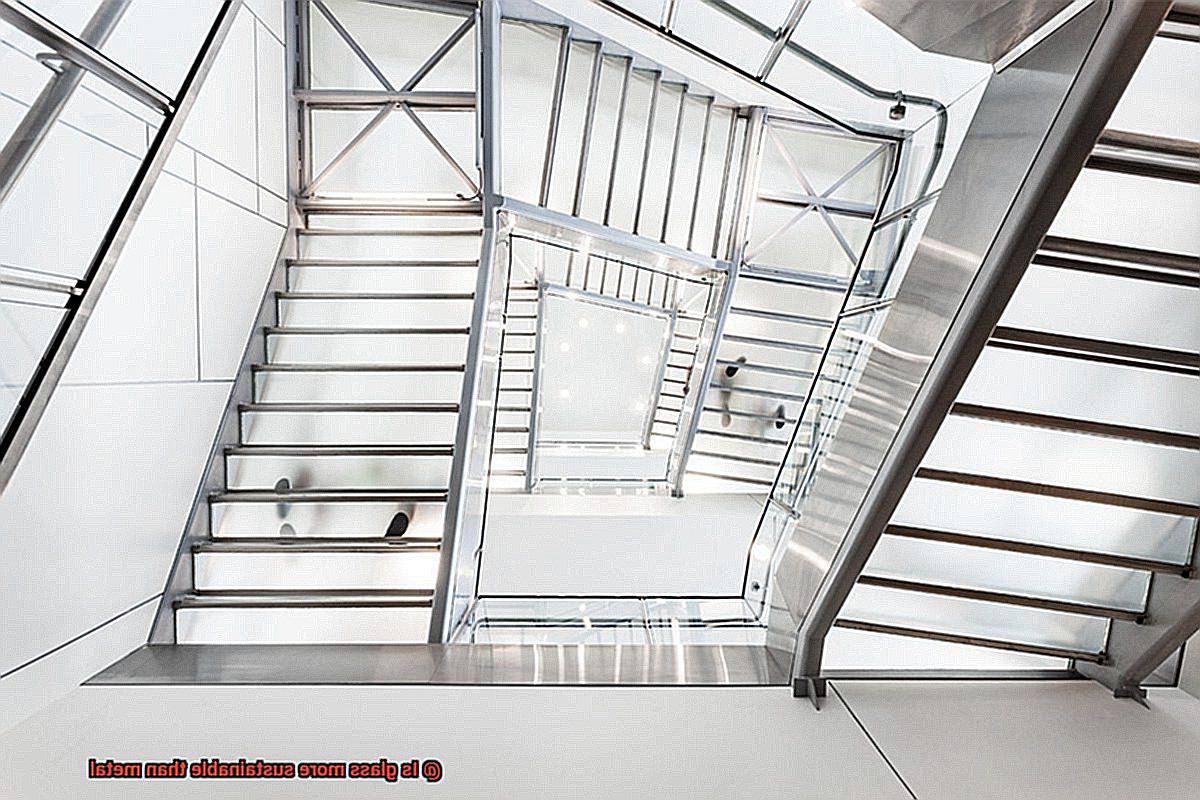
When it comes to the energy requirements for glass and metal production, there are some noteworthy differences. Glass production typically requires more energy in the melting process, as raw materials like sand, soda ash, and limestone need to be heated to extremely high temperatures to melt and fuse together.
Conversely, metal production requires more energy in the extraction and refining process, as ores must be mined and processed to obtain the metal.
But here’s the good news: both industries have made significant strides in recent years to reduce their energy consumption and environmental impact. Many glass manufacturers now use recycled glass in their production processes, significantly reducing the amount of energy needed to melt the raw materials.
Similarly, metal producers have implemented more efficient extraction and refining processes that use less energy and produce fewer emissions.

When it comes to sustainability, it’s challenging to say which material is more sustainable; it ultimately depends on a variety of factors such as manufacturing processes used, end use of the product, and how well it is recycled or repurposed at the end of its life cycle.
Nonetheless, both materials have their own unique advantages and challenges. Glass is infinitely recyclable and can be reused multiple times without losing quality, while metal recycling can sometimes result in a loss of quality depending on the specific alloy being recycled.
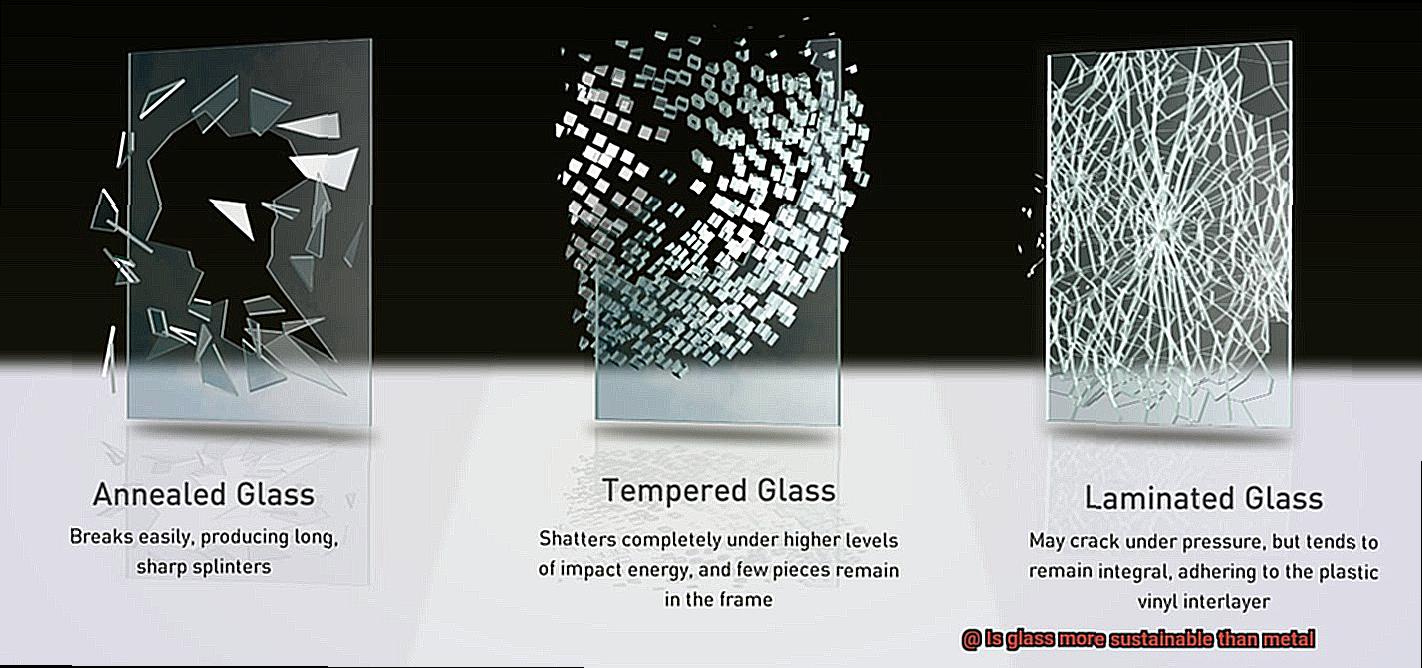
Environmental Impact of Mining Metals
Digging deep into the ground to extract metals can cause land degradation and soil erosion, leading to deforestation, loss of biodiversity, and water pollution.
Metals such as copper and lead are usually found in rock formations that contain sulfides. When these rocks are exposed to air and water during the mining process, they can create acid mine drainage, which is highly toxic to aquatic life. Moreover, the energy required to extract metals from the earth is massive and usually generated from fossil fuels like coal and oil. As a result, carbon dioxide is released into the atmosphere, contributing to climate change.
In contrast, glass production is more environmentally friendly than metal production. Glass is made from natural resources like sand, soda ash, and limestone, which are easy to source without causing significant harm to the environment.
Additionally, glass production requires less energy than metal production. It’s noteworthy that glass can be recycled indefinitely without losing its quality or purity, making it a highly sustainable material.
Durability of Metal Products
When it comes to comparing glass and metal products, durability is an indispensable factor to consider.
Undoubtedly, metal products are renowned for their exceptional strength and durability, making them a top choice for several industries such as construction, transportation, and manufacturing. Nonetheless, the durability of metal products can fluctuate depending on various factors such as the type of metal used, its quality, and the conditions in which it is used.
One of the primary concerns with metal products is corrosion. Metals such as iron, steel, and aluminum are susceptible to corrosion when exposed to moisture or certain chemicals. This can weaken the metal and significantly reduce its lifespan. However, modern manufacturing techniques have led to the development of corrosion-resistant metals that are more durable and long-lasting.
On the other hand, glass products are frequently considered fragile and breakable. But if appropriately manufactured and handled with care, glass products can be extremely durable and long-lasting. For instance, tempered glass is heat-treated to make it stronger and more resistant to breakage. Moreover, glass products can be recycled repeatedly without losing their quality, making them a sustainable option.
When assessing the durability of glass and metal products, it’s crucial to consider the specific application. In some cases, metal may be a better option due to its superior strength and durability. In other scenarios, such as with single-use packaging materials, glass may be a more sustainable option due to its recyclability.
Biodegradability of Glass and Metal
It’s 100% recyclable and can be recycled indefinitely without losing its quality or purity.
This means that glass can be reused over and over again, leading to a reduced demand for raw materials extraction and processing. Plus, when it comes to biodegradability, glass is inert and non-toxic, so it won’t release harmful substances as it breaks down.
However, it’s important to note that glass can still take hundreds or even thousands of years to decompose in a landfill. Now, let’s talk about metal.
It’s also recyclable, but the recycling process often involves melting the metal down, which can lead to a loss of quality and purity. As a result, recycled metal may not be suitable for all applications and may need to be combined with new raw materials.
Additionally, some metals are more challenging to recycle than others, resulting in a higher environmental impact. In terms of biodegradability, metals don’t break down naturally in the environment and can take even longer than glass to decompose.
Furthermore, as metals corrode over time, they can release toxins that pose a potential risk to the environment and human health.
Overall Comparison of Sustainability Between Glass and Metal
As we strive towards a more sustainable world, it’s important to consider the impact of the materials we use. Glass and metal are two common materials that we encounter every day, but which one is more sustainable? As an expert in this field, let me explain the overall comparison of sustainability between glass and metal.
Recyclability
Firstly, let’s talk about recyclability. Glass is a superhero in this area. It can be recycled infinitely without losing its quality or purity, making it a highly sustainable material. Metals, on the other hand, require a significant amount of energy to recycle, and the quality of the recycled material may not be as high as the original. So when it comes to recyclability, glass has a clear advantage.
Environmental Impact
Next up is environmental impact. Glass is made from natural raw materials such as sand, soda ash, and limestone, making it more environmentally friendly than metal. Metal production requires a significant amount of energy and emits a large amount of greenhouse gases. So when it comes to environmental impact, glass is again the winner.
Biodegradability
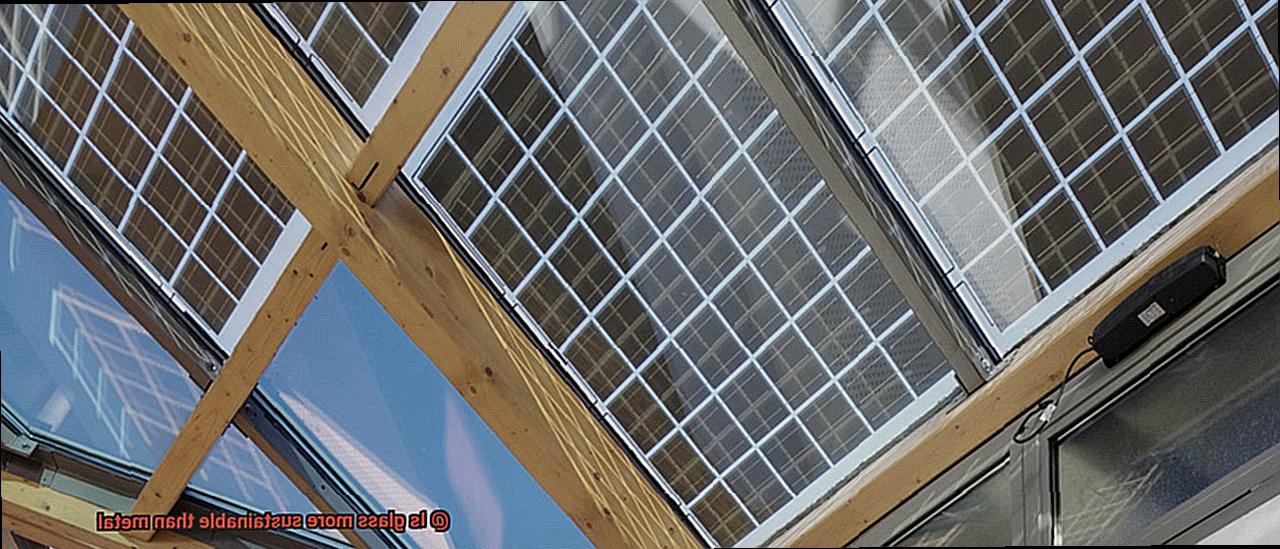
Now let’s talk about biodegradability. Unfortunately, neither glass nor metal is biodegradable. However, when glass breaks down, it is inert and doesn’t release any harmful chemicals into the environment. Some metals like lead and mercury can be toxic when they break down and can harm the environment.
Overall, while both glass and metal have their benefits and drawbacks in terms of sustainability, glass comes out on top due to its high recyclability, environmentally friendly production process, and inert nature when it breaks down. Choosing glass over metal is a small but effective step towards a more sustainable future.
DBLKlzz1deQ” >
Conclusion
In conclusion, the sustainability of glass versus metal is a nuanced topic with no easy answers. Each material has its own set of advantages and disadvantages when it comes to environmental impact, recyclability, energy consumption, durability, and biodegradability. Ultimately, the sustainability of either material depends on a variety of factors such as manufacturing processes, product use and disposal, end-use applications, and recycling or repurposing at the end of its life cycle.
However, after careful consideration of all these factors, it becomes clear that glass outperforms metal in terms of sustainability. Glass is made from natural raw materials such as sand and minerals that are abundant and easily accessible. It’s also 100% recyclable without any loss in quality or purity, making it an ideal choice for sustainable products. Additionally, glass production requires less energy than metal production and has a lower carbon footprint.
In contrast, while metals like aluminum and steel are also recyclable materials; they require more energy to recycle than glass. Furthermore, metal production contributes significantly to environmental degradation through land degradation, soil erosion, deforestation loss of biodiversity, water pollution and greenhouse gas emissions.
Therefore, choosing glass over metal can be seen as a small but impactful step towards building a more sustainable future for our planet. As consumers become increasingly aware of their impact on the environment through the products they use every day; it’s essential to make informed decisions about which materials we choose to support sustainable practices.
